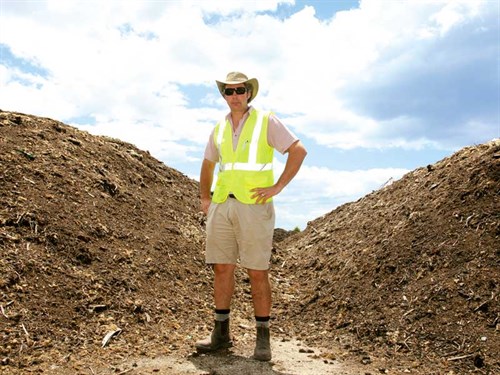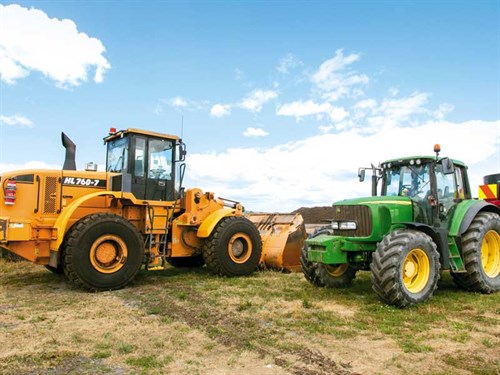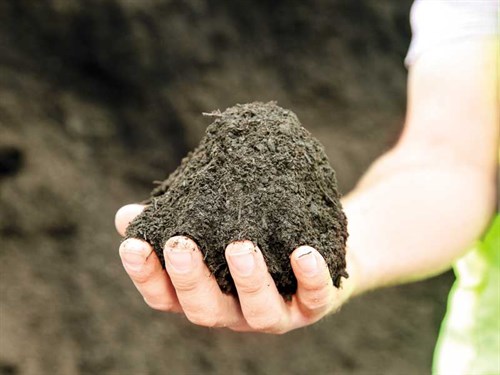Business Profile: Bio Rich Ltd





























|

|

|

|

|

|

|

|

|

|

|

|

|

|
Farm Trader checks out Mike Glazebrook's company Bio Rich Ltd processes mountains of the stuff often known as ‘Black Gold.’
To be precise, 25,000 tonnes of Hawke’s Bay’s organic waste gets turned into 40,000 cubic metres of compost between two sites, Awatoto and Te Tua station, annually.
That’s a heck of a lot of waste not going into the landfill. It’s not surprising to learn then that the company motto is ‘taking waste out of the environment and putting it back on the soil’.
In other words, BioRich’s mission is to divert organic matter (carbon) from ending up in places where it can do a lot of harm – in our atmosphere and water – and putting it somewhere it can do a lot of good: in our soils. And they believe in doing this in the most simple, efficient way.
When Mike grew large-scale organic crops, it just made sense to him to feed the soil with his own homemade compost. From there it evolved into a larger scale commercial operation, BioRich Ltd, which began in 2004 on his property, Te Tua Station at Maraekakaho and the operation at Awatoto in 2006.

At Awatoto, near Napier, a team of big machines is busy processing piles of raw material in various stages. It’s a bit like baking a cake but multiplied somewhat.
What comes in is bulk waste material from commercial companies such as Silver Fern Farms and Watties, as well as packhouses, wineries, fisheries, and wool scourers.
Then there is green waste from Hastings City and Central Hawke’s Bay District Council plus commercial gardeners, arborists, and landscapers. As well there’s sawdust from timber mills and waste bark from the port of Napier.
There’s also a public area at Awatoto where people drop off their green waste.
Green waste and the other bulk material are blended and then windrowed over aeration lines for two weeks to speed up decomposition.
"The forced aeration system is the secret ingredient," BioRich operations manager, Nigel Halpin, says. By this, he means a system of fans blowing air through channels beneath a concrete pad.
"For every tonne of waste, we add a tonne of bulking material such as sawdust, bark and green waste. You need nitrogen, carbon, water and oxygen. The waste tipped on the pad is our nitrogen source and the sawdust, green waste and bark is our carbon source.
"The ingredients are thoroughly mixed, then loaded onto an aeration line. Within 48 hours we have reached 55 degrees Celsius.
"We put the product on here and it increases by 55 degrees by day two. That heat comes from the biology; it’s as if we’ve got millions and millions of unpaid workers in there and as they are moving, they are creating heat and respiring and breaking everything down.
"We then continue to windrow and age the product until its aged enough and given a final run through a screen before it’s ready to go."

From start to finish, it takes three months to process compost ready for the horticulture market and six months for the retail market.
To get the work done, the company uses machinery that has some fairly serious grunt, such as three John Deere 724K loaders and one Hyundai 760-7 loader.
"All have oversized buckets because our product is light. The standard size bucket on the John Deere is 3.5 cubic metres, but we extend that to six cubic metres with an engineered hungry board on it, which is basically an extension to the top and sides," Nigel says.
Then there’s a Jaylor mixer used for custom blends of compost.
"Because it’s really abrasive product to process, it has Hardox wear plates on the augers and a liner on the body of the mixer. It’s also specced with heavy-duty gearboxes.
"We have made a custom ring main irrigation system set up so we can dump two tonnes of water in there quickly if needed, to add to the product."
Another piece of equipment that’s used is a former bulb (plant) washer that’s been modified for use as a stone separator.
The Fliegl 120 spreader is another fantastic piece of machinery based at Te Tua Station and used for spreading large amounts of compost on the paddocks.
The day Farm Trader visited, Composting NZ’s (seen in DOW issue 276) 450HP Willibald mulcher was munching its way through a stack of green waste as it does on a monthly basis.
A Komptech screener processes bark – it’s basically like a giant sieve and has a screen – that take the fines out, which then goes straight into the compost and the rest is ground up by a rotochopper for composting.
There’s a high demand for the high-quality BioRich compost, which is mostly sold in bulk.
"We send 10,000 cubic metres to the Bay of Plenty for the horticulture industry, which is mostly Kiwi fruit and about 10,000 cubic metres goes into organic apple orchards around Hawke’s Bay. Another 10,000 cubic metres go into other cropping and orchards in Hawke’s Bay.

"We are also making BioGro certified compost for organic producers and conventional compost too. The biggest change in sales we are seeing is the conventional growers are using more and more," Nigel says.
Nigel spent eight years working for Heinz Watties and leased land on behalf of HW for growing vegetables. Some of that lease land belonged to Mike, and Nigel was impressed with what he saw and so ended up working for him.
"Te Tua Station is a 1200ha sheep beef and cropping property, of which we are currently converting a 65ha block to organics for maize grain.
"We run bull beef, Wagyu, and trade lambs through the winter. The results from adding the compost are fantastic. It helps the soil exceptionally and is a good way to sustain continual cropping. The ground works up easily. We are maintaining the fertility and the soil life.
"As well, it contributes to stock health. All our trading lambs are on the cropping flats in the winter and these flats get a compost application every year."
As for the future, Nigel says BioRich is working closely with industry and community groups to promote recycling. This includes food waste generated at the farmers markets through to leftovers from cafes such as Hapi in Napier.
Keep up to date in the industry by signing up to Farm Trader's free newsletter or liking us on Facebook


.jpeg)
.jpg)
.jpeg)

.jpg)
.jpeg)
.jpg)
.jpeg)







